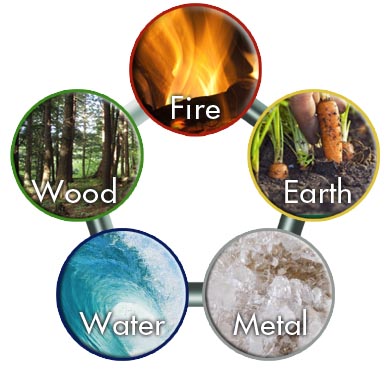The Five Elements Theory is a fundamental concept in Traditional Chinese Medicine (TCM) that provides a framework for understanding the dynamic interplay between different aspects of our being and the natural world. This theory recognizes five elements – Wood, Fire, Earth, Metal, and Water – and their corresponding attributes, organs, emotions, and seasons. In this article, we explore the principles and applications of the Five Elements Theory, highlighting its role in balancing the body and mind for optimal health and well-being.
Wood Element:
The Wood element represents growth, expansion, and flexibility. In TCM, the Liver and Gallbladder are associated with this element. The Wood element governs the smooth flow of Qi (vital energy) throughout the body and supports physical and emotional flexibility. Imbalances in the Wood element may manifest as frustration, anger, or stagnant energy. Balancing the Wood element involves practices that promote relaxation, stress reduction, and the free flow of Qi.
Fire Element:
The Fire element represents warmth, enthusiasm, and vitality. The Heart and Small Intestine are associated with this element in TCM. The Fire element governs emotional well-being, communication, and joy. Imbalances in the Fire element can lead to restlessness, anxiety, or emotional instability. Balancing the Fire element involves cultivating inner calmness, practicing mindfulness, and engaging in activities that promote joy and connection.
Earth Element:
The Earth element represents nourishment, stability, and grounding. The Spleen and Stomach are associated with this element in TCM. The Earth element governs digestion, nurturing, and transformation. Imbalances in the Earth element may manifest as worry, overthinking, or digestive issues. Balancing the Earth element involves adopting a nourishing diet, establishing healthy routines, and cultivating gratitude and mindfulness.
Metal Element:
The Metal element represents purity, clarity, and inspiration. The Lungs and Large Intestine are associated with this element in TCM. The Metal element governs respiration, elimination, and the exchange of energy. Imbalances in the Metal element can lead to grief, sadness, or respiratory issues. Balancing the Metal element involves practicing deep breathing exercises, embracing inspiration, and letting go of emotional attachments.
Water Element:
The Water element represents fluidity, wisdom, and adaptability. The Kidneys and Bladder are associated with this element in TCM. The Water element governs the vital essence, reproductive health, and the flow of life energy. Imbalances in the Water element may manifest as fear, insecurity, or issues related to the urinary system. Balancing the Water element involves practices that promote relaxation, rejuvenation, and connecting with nature.
Applications of the Five Elements Theory:
- Diagnosis and Treatment: TCM practitioners use the Five Elements Theory to assess the energetic imbalances in an individual’s body and mind. Based on the identified imbalances, personalized treatment plans are created to restore harmony and balance.
- Mind-Body Connection: The Five Elements Theory recognizes the intricate connection between our physical health and emotional well-being. By understanding the relationships between the elements, individuals can gain insights into their emotional patterns and use this knowledge to support their overall health.
- Lifestyle and Self-Care: The Five Elements Theory provides guidance for lifestyle choices, self-care practices, and cultivating a balanced and harmonious life. By incorporating activities and habits that correspond to each element, individuals can promote their well-being and nurture their mind, body, and spirit.
- Seasonal Adjustments: The Five Elements Theory also relates to the seasons, with each element corresponding to a particular time of the year. By aligning with the natural cycles, individuals can make appropriate adjustments in their lifestyle, diet, and self-care practices to maintain balance throughout the seasons.

The Five Elements Theory in Traditional Chinese Medicine offers a profound understanding of the interconnectedness between our body, mind, and the natural world. By recognizing and balancing the elements within ourselves, we can achieve optimal health, emotional well-being, and harmony. Through practices that align with the Five Elements, such as mindfulness, movement, and self-care, we can nurture the balance between body and mind, fostering a state of wholeness and vitality.









